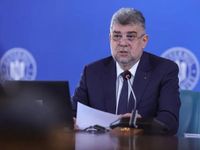In a controversial statement that has sparked significant backlash, former Romanian Prime Minister Victor Ponta claimed he willingly flooded Romanian villages in 2014 to prevent Belgrade from experiencing catastrophic flooding. This assertion, made during a podcast, has drawn sharp criticism from political opponents and former government officials who vehemently dispute his version of events.
Ponta, who is currently running for president with the campaign slogan “Romania First,” stated that he ordered the opening of the Iron Gates dam to protect Serbia’s capital during a severe flood event that year. He described his decision as an extraordinary act of leadership, asserting, "I took the decision to flood Romanian villages to save Belgrade, acting as Prime Minister at 12 AM. A leader must make quick and correct decisions.”
However, these claims have been met with skepticism. Cristian Tudor Popescu, a prominent journalist, questioned Ponta's motivations, suggesting that his statements reflect a desire to position himself as an "Authoritarian Supreme" figure. Popescu remarked, “Why did he say this voluntarily, without any media pressure, during an electoral campaign?” He further noted that Ponta's approach to leadership seems to embrace a narrative of sovereignty that borders on authoritarianism.
Popescu's comments highlight the potential implications of Ponta's statements, particularly as they relate to his presidential aspirations. He pointed out that Ponta's rhetoric might resonate with a segment of the Romanian population that is increasingly drawn to strongman politics, stating, “Given the current thirst of the Romanian majority to be ruled again by a single man, it is possible that Ponta's calculations align with the market's demands.”
The backlash against Ponta intensified following his remarks, with several political figures calling for him to withdraw from the presidential race. Prime Minister Marcel Ciolacu, along with other coalition leaders, expressed their outrage, while Vlad Gheorghe, head of the DREPT party, announced plans to file a criminal complaint against Ponta for high treason.
In response to the criticism, Ponta defended his actions, arguing that he prioritized the safety of Romanian citizens during the 2014 floods, which he claimed were the most severe in 120 years. He insisted that no lives were endangered on the Romanian side of the Danube and that the decision ultimately saved thousands of lives in Serbia. “In 2014, I took care of Romanians first—no resident in the Danube river area was in danger,” he stated on social media.
Yet, former ministers from Ponta's administration have contradicted his narrative. Doina Pană, who served as Minister of Environment, Water, and Forests during Ponta's tenure, stated, “We did not exceed 13,200 cubic meters of water on the Danube, and therefore, we were not required to open the Iron Gates. I don’t know what orders he gave to the Romanian structures.”
Liviu Dragnea, Ponta's former Deputy Prime Minister, went further, labeling Ponta's claims as an example of "mythomania," asserting that Ponta distorts the truth for his own benefit. Dragnea commented, “At that time, Belgrade was already flooded, and he could not have helped. Ponta is trying to hide the real reason for his Serbian citizenship, which he views as a backup plan in case of legal troubles.”
Dragnea added that he was actively involved in disaster prevention efforts during the floods and was informed by representatives from the Romanian Waters Agency that the water levels were rising dangerously. He emphasized that there were plans in place to manage potential flooding without Ponta's intervention, stating, “I went to the Iron Gates with a Ministry of Internal Affairs helicopter to create a plan that would allow local authorities to manage the situation.”
Adding to the controversy, Hidroelectrica, the company managing the Iron Gates dam, released a statement asserting that its operations during May 2014 adhered to the Romanian-Serbian convention ratified in 1999. They reported that the maximum flow recorded at Iron Gates I during that period was 12,600 cubic meters per second, which was within the limits set by the agreement.
The company clarified that they operated in compliance with the regulations and that the water levels were managed to prevent exacerbating the flooding situation. This statement directly contradicts Ponta's assertion that he took unilateral action to flood Romanian villages for the sake of Serbia.
The situation has ignited a heated debate in Romania, with many questioning the implications of Ponta’s statements for his political future. As the presidential election approaches, the fallout from this incident could significantly impact his campaign. Ponta's narrative, while aiming to showcase his leadership during a crisis, may instead be perceived as an attempt to manipulate public sentiment.
As the political landscape continues to evolve, it remains to be seen how voters will react to Ponta's controversial claims and whether they will influence his standing in the upcoming election. With the backdrop of a divided political environment, the discussions surrounding Ponta's statements reflect broader concerns about accountability, leadership, and the nature of political discourse in Romania.
In the end, the controversy surrounding Victor Ponta's remarks raises critical questions about the responsibilities of leaders during crises and the narratives they construct to justify their actions. As Romania prepares for the presidential election, the implications of this incident will likely resonate well beyond the immediate political arena.






